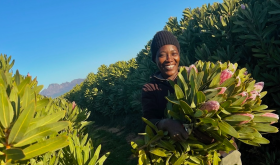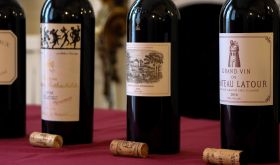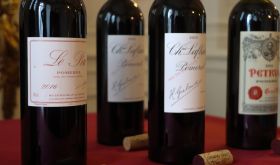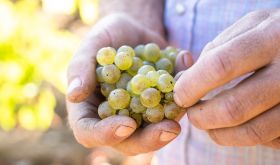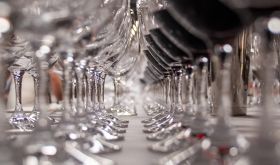This summer I hope we can enjoy a completely new eating outdoors vibe. Out with the second jumper, restaurant blanket, overhead heater and fingerless gloves. In with lounging on new-mown grass or on a vine-shaded terrace, concerned not with keeping our main course warm enough but with keeping our wine cool enough.
My favoured way of doing this has been to use those cylindrical wine coolers that require no ice cubes (so there are no drips) and are pretty good at maintaining a steady temperature for any bottle of wine in them. The plastic ones are the lightest and I have a battery of clear plastic ones that allow one to see at a glance which bottle is in which cooler.
But if you are setting out on a picnic, carrying such hardware along might be a bit of a pain, and cool bags can cause inconvenient condensation. There is a new sort of reusable, insulated wine bottle, very like the colourful water bottles so many people carry, designed specifically for wine: £24.99 apiece from Sup Drinkware or £35 in a smart tube from Partner in Wine. They both sell insulated beakers with lids too – for really slow sippers presumably – and there’s a range of colours. (I’m not quite sure about Sup’s pale turquoise one for wine, but I clearly need to throw off decades of conditioning.) These insulated bottles are lighter and of course less breakable than glass and could be added to a picnic bag without any risk of soggy sandwiches.
But they wouldn’t work for sparkling wine – or at least the wine would lose much of its fizz while being decanted into them – nor for very fragile wine that should not be exposed to air before being consumed. So that Montrachet from the 1930s might suffer while being decanted into a Sup bottle – but most modern wines shouldn’t suffer at all.
For a casual picnic I’d be all in favour of wine in a can. Cans are light, convenient, recyclable and relatively good for the planet. Cans and connoisseurs are not a match made in heaven but I have come across a few canned wines I would happily drink in any circumstances and which are cleverly and smartly labelled. The Uncommon, Gerald Bubbly White Wine 2020 is a light young English fizz based on Bacchus, a distinctively English grape with aromas of hedgerow, and this current vintage offers a good balance of fruit and refreshment.
My fellow Master of Wine Richard Kelley has come up with three particularly wittily packaged South African wines available in cans: Chenin No 5 2019, The Francophile Syrah 2020 and Vasco and the Explorers Alvarinho 2020. These are delicious by any measure and are also available in bottles. South Africa seems to be a particularly rich source of good canned wine, thanks largely to CanCan, a canning company co-founded by talented winemaker Francois Haasbroek.
Drinking wine straight from a single-serve can means you miss out on most of the all-important aroma, but in the pandemic era it may at least reduce the risk of infection. Someone ought to design a simple way of distinguishing between wine glasses; I use different coloured rubber bands round the stems but they are not exactly elegant. (One other advantage cans have over bottles is that, for impecunious newcomers to wine, they involve less commitment of money and drinking capacity. A wine bottle contains 75 cl of wine, three times as much as most cans.)
Another package for wine that is becoming increasingly respectable by the day and might be particularly suitable for a barbecue is the bag-in-box. The wine company associated with Fergus Henderson’s cultish St John restaurant has long been a particular fan of this format, selecting a red (best value by far), white and rosé each year to retail at £38 for a three-litre box that is the equivalent of £9.50 a bottle.
Private Cellar, a company that seems particularly dedicated to supplying well-heeled, wine-loving country-dwellers, has decided to plump for five-litre boxes for its rather superior Provence rosé Figuière Méditerranée (they have keen thirsts in the shires). This pale, dry, lightly smoky wine from an organic estate between Toulon and St-Tropez is £76 a box, the equivalent of £11.40 a bottle. I would have thought the challenge when entertaining outside on a hot day might be to keep the box cool enough. Admittedly, because of the volume, it won’t warm up as fast as a bottle but perhaps one of those silvered thermal blankets might help. There may be an opportunity for someone who can make them tailored to wine boxes with an opening for the tap. The team at Private Cellar suggest chilling the cardboard box beforehand and then opening it at the top and putting an ice pack on the foil bag.
There is always an ice bucket, or just a bucket, of ice and water to cool non-cardboard wine packages such as bottles and cans. Do remember that contact with cold water is much more effective than with ice cubes alone – although if it’s very hot, the ice cubes will presumably melt soon enough.
Serving red wine in high temperatures is quite an art. I always put bottles of red wine in the refrigerator for an hour or so before taking them outside and then firmly keep them in one of the cylindrical bottle coolers referred to above, because red wine served too warm, anything much over 24 °C/75 °F, is pretty unappetising. The refreshment value that is key to all drinks is lost, and much of the complex aroma is dissipated. Indeed even indoors, I increasingly serve reds straight from our cellar, which is a constant 13 °C/55 °F, so that they warm up gradually in the glass. The exceptions to this are young reds with masses of the chewy tannins, which are emphasised at low temperatures, and which I would serve initially closer to 17 °C/63 °F.
There’s a certain sort of hearty red that seems a natural partner for the smoky flavours and, often, chewy meats associated with barbecues. I have suggested a few from the wines I have tasted most recently, along with wines from quintessential holiday locations such as Cassis, Bandol and Bellet overlooking France’s Mediterranean coast. It seems especially appropriate to choose a wine from a country where barbecuing is a national sport. Australia, South Africa and Argentina spring most readily to mind.
And if it rains, or is unseasonably chilly, one of these full-bodied reds might offer some liquid comfort.
Recommended for summer drinking
Whites
The Uncommon, Gerald Bubbly White Wine 2020 England 11.5%
£4.99 per 25-cl can Waitrose, Selfridges
The Liberator, Chenin No 5 2019 Swartland 13%
About £5 a 25-cl can from all these stockists according to Richard Kelley MW: The Bottle Shop of Cardiff, Boutique Wines of Dublin, Brigitte Bordeaux of Nottingham, Brixton Wine Club, Butlers Wine Cellar of Brighton, Carruthers & Kent of Newcastle, Cornelius of Edinburgh, Ellis Wharton of Cornwall, George Hill of Loughborough, Gwin Dylanwad of Wales, Harrogate Wine Company, Old Bridge Wine Shop of Huntingdon, Valhalla's Goat of Glasgow, Lockett Bros of North Berwick, Mr & Mrs Fine Wine of Southwell, The Solent Cellar of Lymington, Quality Wines, Salut of Manchester, South Downs Cellars, Shekleton Wines of Stamford, Sheldons Wine Cellars, Wine Reserve of Cobham, Wright Wine Company of Skipton, Woodwinters of Scotland, Worth Brothers Wines
The Liberator, Vasco and the Explorers Alvarinho 2020 Coastal Region, South Africa 14%
About £5 per 25-cl can Harvey Nichols and other independents
Cape Atlantic Sauvignon Blanc 2020 Western Cape 13.5%
£10.25 Stone, Vine & Sun
Piekenierskloof Grenache Blanc 2019 South Africa 13%
£12.50 Stone, Vine & Sun
Pandolfi Price, Larkün Chardonnay 2018 Itata, Chile 14%
£14.25 Stone, Vine & Sun
Rosés
Clos Ste-Magdeleine 2020 Cassis 13%
£24.50 Yapp Brothers
Dom de la Source 2018 Bellet 13%
£27.50 Yapp Brothers
Reds
The Liberator, The Francophile Syrah 2020 Cape Town 14%
About £5 per 25-cl can Bacchanalia Wine Merchants of Cambridge and The Riddling Rack of Newton-le-Willows
Mas Bruguière, L’Arbouse 2019 Pic St-Loup 13.5%
£19.50 Yapp Brothers
Chatzivaritis, Carbonic Negoska 2019 Greece 10.8%
£20.50 Kudos Wine, £23.50 Maltby & Greek, £26 LITTLEWINE
José Zuccardi Malbec 2016 Uco Valley, Argentina 14.5%
£37.95 Winedirect, £312 a dozen Bordeaux Index
Torres, Mas La Plana 2015 Penedes, Catalunya 14.5%
£46.55 VINVM
International stockists on Wine-Searcher.com
Photo at the top of this article by Mason Dahl on Unsplash.








